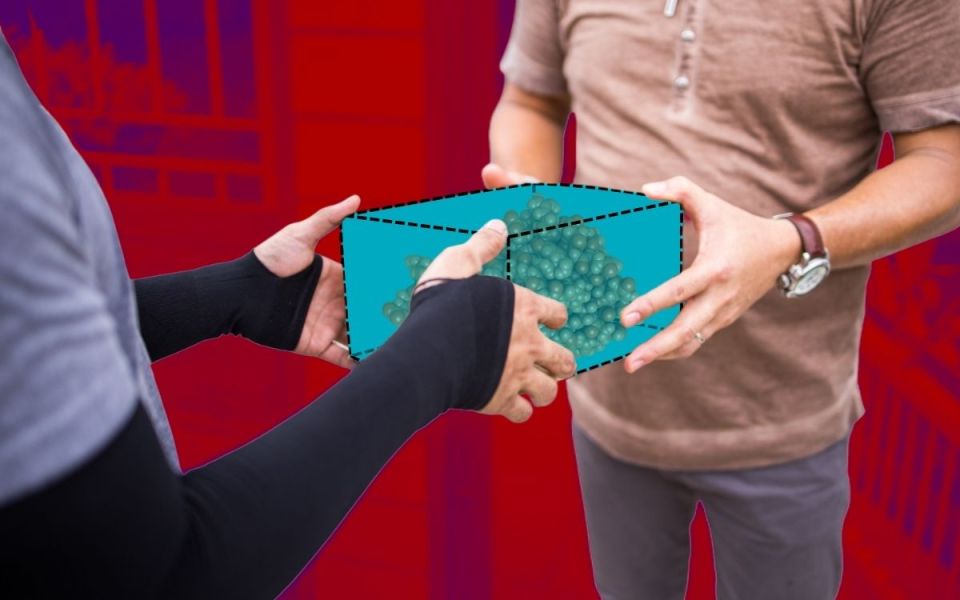Will the Science of Exosomes Revolutionize Medicine?

Have you ever sat and really considered how amazing our modern communication and delivery network is? Not long ago, communication and delivery were limited to face-to-face interactions and direct handoffs. Now we have phones, flights, FedEx, and fiber-optic cables that deliver information and items across the world in a fraction of the time. In the body, exosomes fill much of the role of delivery driver and telephone line.
What We know
Exosomes are tiny packages that look like nano-sized cells. They’re about the size of a virus - and are found in blood, breastmilk, saliva, and other body fluids [1, 2]. Exosomes are made by “parent cells,” which fill them with fatty lipids, important proteins, and pieces of genetic information (like DNA and RNA) [3].
Exosomes have proteins on their surface that make them highly functional. Some proteins work like an address label, ensuring the exosome is delivered to specific cells- just like a FedEx or UPS label (except they routinely deliver my packages to the wrong house).
Exosomes have the ability to alter cell behavior, affect gene expression, and deliver tools like proteins to other cells to carry out specific tasks. They can also regulate the immune system and contribute to the repair of damaged tissues in healing wounds [4]. The abundance of functions exosomes perform in the body makes them a ripe target for disease treatments.
What We Don’t Know
Exosomes show great promise for the medical field. Potential applications include [2, 4]:
- Drug delivery
- Medications have to be coated to avoid getting destroyed, but the coatings may be inefficient, dangerous in large amounts, or evoke an immune response.
- Regenerative care
- Exosomes from bone marrow promote tissue regeneration and wound healing.
- Anti-cancer medications
- Some exosomes target cancerous tumors. These may be able to be modified to make cancer vaccines.
- Anti-virals
- Select viruses (HIV, ebola, influenza, hep b/c) act like exosomes, so exosomes may be able to fight them.
- Other infectious diseases
- Exosomes may be able to fight bacteria, toxoplasmosis, and flatworms.
Even though exosomes have so many potential uses, actually using them is pretty tricky. Scientists are trying to figure out how to create exosomes that carry the right drugs, proteins, or other helpful substances to fight diseases. The challenge is making sure only the things you want are included, without adding any extra or unknown particles that could cause problems [5].
How We Learn What We Don’t Know
Randomized, controlled clinical trials are the gold standard for discovering if a medication is safe and effective. If a medication or delivery system (like exosomes) has the evidence to back up a safe and effective designation, it may be approved by the US FDA. As of the writing of this article, the US FDA has not approved any exosome medications [6, 7]. Despite this, some cosmetic companies are advertising exosome-based therapies, which may be misleading. There is currently no data showing that cosmetic uses of exosomes are safe or effective, and the only way to discover this information is through clinical trials.
Clinical trials studying exosome-based therapies will likely follow one of the three following approaches [1]:
- Drug delivery, giving new methods of getting known drugs to specific cells
- Regenerative medicine, using bone marrow derived (mesenchymal) exosomes to help heal damage
- Genetic information delivery, being able to deliver mRNA or miRNA to our cells enabling them to build proteins that can help solve problems or halt the production of harmful proteins (like viral proteins)
This is an exciting area of development! Watch for new exosome clinical trials and developing science to help build the communication and delivery network between medicine and our bodies!
Creative Director Benton Lowey-Ball, BS, BFA
|
Click Below for ENCORE Research Group's Enrolling Studies |
|
Click Below for Flourish Research's Enrolling Studies |
References
[1] Santos, P., & Almeida, F. (2021). Exosome-based vaccines: history, current state, and clinical trials. Frontiers in immunology, 12, 711565. https://pmc.ncbi.nlm.nih.gov/articles/PMC8317489/
[2] Lee, K. W. A., Chan, L. K. W., Hung, L. C., Phoebe, L. K. W., Park, Y., & Yi, K. H. (2024). Clinical applications of exosomes: a critical review. International Journal of Molecular Sciences, 25(14), 7794. https://pmc.ncbi.nlm.nih.gov/articles/PMC11277529/
[3] Hu, Q., Su, H., Li, J., Lyon, C., Tang, W., Wan, M., & Hu, T. Y. (2020). Clinical applications of exosome membrane proteins. Precision Clinical Medicine, 3(1), 54-66. https://pmc.ncbi.nlm.nih.gov/articles/PMC7099650/
[4] Gurunathan, S., Kang, M. H., & Kim, J. H. (2021). A comprehensive review on factors influences biogenesis, functions, therapeutic and clinical implications of exosomes. International journal of nanomedicine, 1281-1312. https://pmc.ncbi.nlm.nih.gov/articles/PMC7898217/
[5] Song, Y., Kim, Y., Ha, S., Sheller‐Miller, S., Yoo, J., Choi, C., & Park, C. H. (2021). The emerging role of exosomes as novel therapeutics: Biology, technologies, clinical applications, and the next. American Journal of Reproductive Immunology, 85(2), e13329. https://pmc.ncbi.nlm.nih.gov/articles/PMC7900947/
[6] Food and DrugAdministration. (6 December, 2019). Public safety notification on exosome products. Safety & availability (biologics). [Website]. Accessed 4 December, 2024. https://www.fda.gov/vaccines-blood-biologics/safety-availability-biologics/public-safety-notification-exosome-products
[7] Food and DrugAdministration. (9 April, 2024). Consumer alert on regenerative medicine products including stem cells and exosomes. Safety & availability (biologics). [Website]. Accessed 4 December, 2024. https://www.fda.gov/vaccines-blood-biologics/consumers-biologics/consumer-alert-regenerative-medicine-products-including-stem-cells-and-exosomes



